Tonkin refers to:
Tonkin refers to:
August 5 is the 217th day of the year in the Gregorian calendar; 148 days remain until the end of the year.
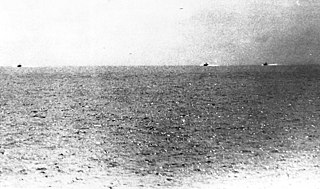
The Gulf of Tonkin incident was an international confrontation that led to the United States engaging more directly in the Vietnam War. It consisted of a confrontation on August 2, 1964, when United States forces were carrying out covert amphibious operations close to North Vietnamese territorial waters, which triggered a response from North Vietnamese forces. The United States government falsely claimed that a second incident occurred on August 4, 1964, between North Vietnamese and United States ships in the waters of the Gulf of Tonkin. Originally, US military claims blamed North Vietnam for the confrontation and the ostensible, but in fact imaginary, incident on August 4. Later investigation revealed that the second attack never happened. The official American claim is that it was based mostly on erroneously interpreted communications intercepts. The National Security Agency, an agency of the US Defense Department, had deliberately skewed intelligence to create the impression that an attack had been carried out.
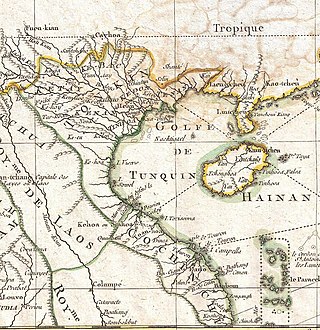
Tonkin, also spelled Tongkin, Tonquin or Tongking, is an exonym referring to the northern region of Vietnam. During the 17th and 18th centuries, this term referred to the domain Đàng Ngoài under Trịnh lords' control, including both the Northern and Thanh-Nghệ regions, north of the Gianh River. From 1884 to early 1945, this term was used for the French protectorate of Tonkin, composed of only the Northern region.
A casus belli is an act or an event that either provokes or is used to justify a war. A casus belli involves direct offenses or threats against the nation declaring the war, whereas a casus foederis involves offenses or threats against its ally—usually one bound by a mutual defense pact. Either may be considered an act of war. A declaration of war usually contains a description of the casus belli that has led the party in question to declare war on another party.
Yankee Station was a fixed coordinate off the coast of Vietnam where U.S. Navy aircraft carriers and support ships operated in open waters over a nine-year period during the Vietnam War. The location was used primarily by aircraft carriers of Task Force 77 to launch strikes over North Vietnam. While the coordinate's official designation was "Point Yankee", it was universally referred to as Yankee Station. Carriers conducting air operations at Yankee Station were said to be "on the line" and statistical summaries were based on days on the line. Yankee Station was initially located at 16° 00′ N, 110° 00′ E, however with a massive increase in operations over North Vietnam in 1966 the station was moved about 145 miles (230 km) northwest to 17° 30′ N, 108° 30′ E, placing it about 90 miles (145 km) from the North Vietnamese shore.
This section of the timeline of United States history concerns events from 1950 to 1969.

The Gulf of Tonkin is a gulf at the northwestern portion of the South China Sea, located off the coasts of Tonkin and South China. It has a total surface area of 126,250 km2 (48,750 sq mi). It is defined in the west and northwest by the northern coastline of Vietnam down to the Hòn La Island, in the north by China's Guangxi Zhuang Autonomous Region, and to the east by the Leizhou Peninsula and Hainan Island.
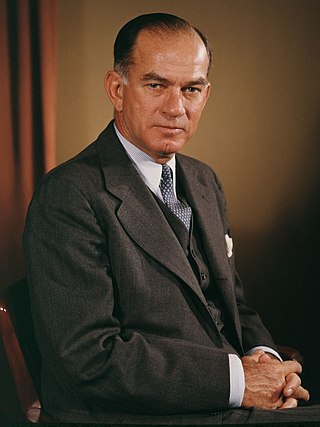
James William Fulbright was an American politician, academic, and statesman who represented Arkansas in the United States Senate from 1945 until his resignation in 1974. As of 2023, Fulbright is the longest serving chairman in the history of the United States Senate Committee on Foreign Relations. He is best known for his strong multilateralist positions on international issues, opposition to American involvement in the Vietnam War, and the creation of the international fellowship program bearing his name, the Fulbright Program.
USS Maddox may refer to:
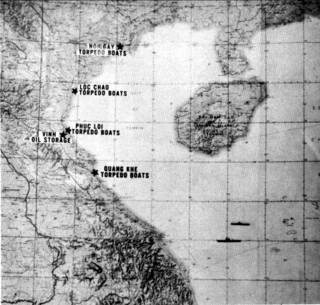
Operation Pierce Arrow was a U.S. bombing campaign at the beginning of the Vietnam War.
The following lists events that happened during 1966 in Australia.
Operation Vulture was the name of the proposed U.S. operation that would rescue French forces at the Battle of Dien Bien Phu in 1954 via B-29 raids based in the Philippines. The French garrison had been surrounded by the Viet Minh during the First Indochina War. When the British government refused to give its support, the plan was cancelled and as a result the French Army organised Operation Condor, an attempt to weaken the Viet Minh artillery's assaults against the besieged French Union garrison.
The following lists events that happened during 1973 in Australia.
Operation 34A was a highly classified United States program of covert actions against the Democratic Republic of Vietnam, consisting of agent team insertions, aerial reconnaissance missions and naval sabotage operations.

The attack on Camp Holloway occurred during the early hours of February 7, 1965, in the early stages of the Vietnam War. Camp Holloway was a helicopter facility constructed by the United States Army near Pleiku in 1962. It was built to support the operations of Free World Military Forces in the Central Highlands of South Vietnam.

Ulysses Simpson Grant Sharp Jr. was a United States Navy four star admiral who served as Commander in Chief, United States Pacific Fleet (CINCPACFLT) from 1963 to 1964; and Commander-in-Chief, United States Pacific Command (CINCPAC) from 1964 to 1968. He was PACOM commander during the Gulf of Tonkin Incident. Sharp was related to Ulysses S. Grant, who married Sharp's great-aunt.

Relations between Vietnam and China had been extensive for a couple of millennia, with Northern Vietnam especially under heavy Sinosphere influence during historical times. Despite their Sinospheric and socialist background, centuries of conquest by modern China's imperial predecessor as well as modern-day tensions have made relations wary. The People's Republic of China (PRC) ruled by the Chinese Communist Party (CCP) assisted North Vietnam and the Communist Party of Vietnam (CPV) during the Vietnam War whilst the Taiwan-based Republic of China (ROC) was allied with South Vietnam.
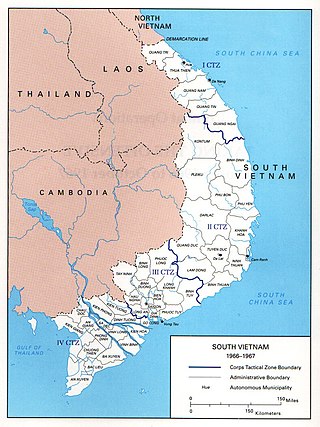
South Vietnam was in political chaos during much of the year, as generals competed for power and Buddhists protested against the government. The Viet Cong (VC) communist guerrillas expanded their operations and defeated the South Vietnamese Army of the Republic of Vietnam (ARVN) in many battles. North Vietnam made a definitive judgement in January to assist the VC insurgency with men and material. In November, North Vietnam ordered the People's Army of Vietnam (PAVN) to infiltrate units into South Vietnam and undertake joint military operations with the VC.
The quagmire theory explains the cause of the United States involvement in the Vietnam War. The quagmire theory suggests that American leaders had unintentionally and mistakenly led the country into the Vietnam War. The theory is categorized as an "orthodox" interpretation of the Vietnam War.

The Gulf of Tonkin Resolution or the Southeast Asia Resolution, Pub. L.Tooltip Public Law 88–408, 78 Stat. 384, enacted August 10, 1964, was a joint resolution that the United States Congress passed on August 7, 1964, in response to the Gulf of Tonkin incident.